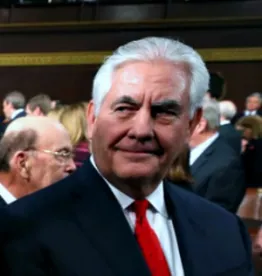During his trip to the Western Hemisphere in early February 2018 – which included stops in Mexico City, Mexico; San Carlos Bariloche and Buenos Aires, Argentina; Lima, Peru; Bogotá, Colombia; and Kingston, Jamaica – U.S. Secretary of State Rex Tillerson stressed the continued importance of the region to the United States. In a speech that he made in Texas before travelling south, Secretary Tillerson highlighted the benefits of increased hemispheric energy trade, which may be the lens through which the Trump Administration views its policy for the Western Hemisphere:
“Building greater prosperity by integrating the wealth of energy resources within the hemisphere is an opportunity that is unique in the world to the Americas.”
Secretary Tillerson further stressed: “By 2040, North America is expected to add more oil production to the global markets than the entire rest of the world combined and more gas production than any other single region. … Our continent has become the energy force for this century, thanks in large part to rapid expansion in natural gas and tight oil production.” He also called for opening energy market economies in the hemisphere, saying:
“Between now and 2030, Latin America is expected to spend at least $70 billion on new electric power generation plants to fuel economic growth. … By building out a more flexible and robust energy system in our hemisphere, we can power our economies with affordable energy. … And we can make our hemisphere the undisputed seat of global energy supply.”
Energy, however, is not the only driver for improved circumstances in the Western Hemisphere, as Secretary Tillerson advocated for more market-based economies in general. He spotlighted Argentina’s recent reforms, including its own tax overhaul, as opening the Argentine economy, driving down the high inflation rate, and attracting investments. The Secretary recognized that economic development and security are not mutually exclusive.
Addressing Venezuela’s regime and its economic challenges, as well as combatting trans-national criminal organizations (TNCs) and the corresponding illicit narcotrafficking trade, will also remain at the forefront of U.S. policy with its neighbors in the hemisphere. Similarly, U.S. relations with Cuba remain complicated. The Trump Administration has rolled back some of the rapprochement started by the Obama Administration, including trade and travel and the withdrawal of some U.S. Embassy personnel in Havana. Secretary Tillerson reaffirmed Colombia as one of the United States’ strongest partners in the region on security-related matters, particularly with respect to dismantling TNCs and combatting illegal drug production capacity.
Meanwhile, President Trump is also pushing for Congress to reform U.S. immigration policies and favors a merit-based approach to address some of the north-bound migration flows from the region (and other parts of the world) to the United States. In January, the President unveiled an immigration framework that contains four elements that he says are necessary for his signature on any congressional bill: (1) border security, including allocation of $25 billion for the border wall; (2) a 10-12 year path for citizenship for those enrolled in the expiring Deferred Action for Childhood Arrivals (DACA) program; (3) ending family chain migration by prioritizing family members to spouses and minor children only; and (4) eliminating the visa lottery system. Democratic Members of Congress remain at odds with their Republican counterparts in addressing DACA and the President’s proposed changes to the U.S. immigration system. With ongoing legal challenges to the President’s decision to end DACA pending in several Federal Courts, Members of Congress are seeking to punt on this issue until after the mid-term elections later this year in November.
Trump Administration – Vacancies, Turnover, & Nominations
A number of vacancies remain across the U.S. Department of State and in the Trump Administration, with a number of Ambassadorial nominations yet to be announced or action by Congress pending on official nominations. On Monday, March 5, President Trump announced his intent to nominate Kimberly Breier to serve as Assistant Secretary of State for Western Hemisphere Affairs and to concurrently serve as a Member of the Board of Directors of the Inter-American Foundation. Ms. Breier has served as a member of the Secretary’s policy planning staff at the Department of State since 2017. She previously served as the Director of the U.S.-Mexico Futures Initiative, Deputy Director of the Americas Program at the Center for Strategic and International Studies (CSIS). If approved by the U.S. Senate, Ms. Breier is positioned to help further shape the Administration’s approach to the Western Hemisphere.
Notably, President Trump has yet to nominate individuals to serve as U.S. Ambassador to Chile, Brazil, Ecuador, Uruguay, Paraguay, Suriname, Bolivia, Venezuela, Panama, Belize, El Salvador, Honduras, Nicaragua, Jamaica, the Bahamas, Trinidad & Tobago, or Cuba. The Administration has also had a higher turnover rate with resignations from career Foreign Service Officers serving as chief diplomats overseas, either due to time in service or objections to President Trump’s foreign policy approach. On March 1, after 30 years of public service, U.S. Ambassador to Mexico Roberta Jacobson – who previously served as Assistant Secretary of State for Western Hemisphere Affairs during the Obama Administration – announced her retirement, which will be effective in May. She is stepping down amid an evolving U.S.-Mexican relationship that seeks to address President Trump’s continued demand that Mexico pay for a border wall to address illegal immigration and drug flows across the U.S. southern border (which Mexico insists it will not finance), and as U.S., Mexican and Canadian negotiators are pushing to complete talks on a modernized North American Free Trade Agreement (NAFTA). There is speculation President Trump may be considering nominating Ed Whitacre, the former Chairman and Chief Executive Officer of General Motors Co., to serve as the next U.S. Ambassador to Mexico. President Trump announced his intention to nominate Florida businessman Leandro Rizzuto, Jr., to serve as U.S. Ambassador to Barbados, St. Kitts and Nevis and to Saint Lucia in early January; and Andrew Gellert to serve as U.S. Ambassador to Chile.
With differing chamber and party priorities, upcoming mid-term elections, and a tight legislative schedule, Congress is moving slowly on the Administration’s nominations. With respect to the Western Hemisphere, the Senate confirmed Kelly Knight Craft as U.S. Ambassador to Canada; Luis E. Arreaga as U.S. Ambassador to Guatemala; and Sharon Day as U.S. Ambassador to Costa Rica in August 2017. The chamber acted in November to confirm Michele J. Sison as U.S. Ambassador to Haiti and also confirmed M. Lee McClenny as the U.S. Ambassador to Paraguay in December. The Senate committee confirmation hearings have resumed in 2018 for some of the outstanding regional nominations. On Wednesday, March 7, the Senate Foreign Relations Committee heard testimony from Joseph E. Macmanus to serve as U.S. Ambassador to Colombia; Robin S. Bernstein to serve as U.S. Ambassador to the Dominican Republic; and Edward Charles Prado to serve as U.S. Ambassador to the Argentine Republic.
Other Influences on U.S. Policy toward the Region
Members of Congress and leaders from U.S. states – particularly Governors and Mayors – are also weighing-in with the Trump Administration on U.S. trade policy with some of its neighbors. Nowhere is this more apparent than the ongoing NAFTA re-negotiations, particularly with President Trump reiterating his threat to withdraw the United States from the agreement should a “fair” deal not be reached. The latest round of “NAFTA 2.0” talks just concluded and another round has tentatively been set for next month in Washington.
U.S. Trade Representative Robert Lighthizer again expressed disappointment at the conclusion of the seventh round of negotiations in Mexico City, stressing there are “roughly 30 chapters” and only six chapters have been closed after seven months of negotiations. The United States is seeking to address modern issues – such as digital trade, labor, environment, and intellectual property – and “rebalance” the agreement to include the elimination of outsourcing, developing rules of origin that “fairly treat” the U.S. manufacturing sector and workers, as well as reshaping the rules of government procurement. Ambassador Lighthizer also acknowledged the longer the negotiations proceed, the more political headwinds the negotiators will face. Mexico will choose a new president on July 1, but the campaigning begins in earnest in April. In Canada, Ontario and Quebec have elections scheduled for later this year. The United States has its mid-term elections in November, which could see a shift in the dynamics of which party controls one or both chambers of the U.S. Congress – the body that ultimately has approval over any new NAFTA deal.
While energy was at the forefront of Secretary Tillerson’s first official trip to the region, the Trump Administration’s Western Hemisphere policy is still coalescing. It remains to be seen whether President Trump or a Cabinet official, such as Secretary Tillerson, will travel to Peru for the Eight Summit of the Americas in mid-April. As with previous Administrations, the U.S. Congress will also seek to shape U.S. foreign policy in general and the Trump Administration’s policy toward the region. Both chambers continue to introduce and/or pass country-specific legislation – such as H.R. 1918 (passed in the House in October 2017) that focuses on Nicaragua – and measures that focus more broadly on national security concerns, such as Iran and Hezbollah (terrorist financing) influence in the region, as well as Russia’s influence. While Secretary Tillerson expressed a theme of deepening U.S. engagement with the region, he also cautioned:
“Our region must be diligent to guard against faraway powers who do not reflect the fundamental values shared in this region.”





 />i
/>i
